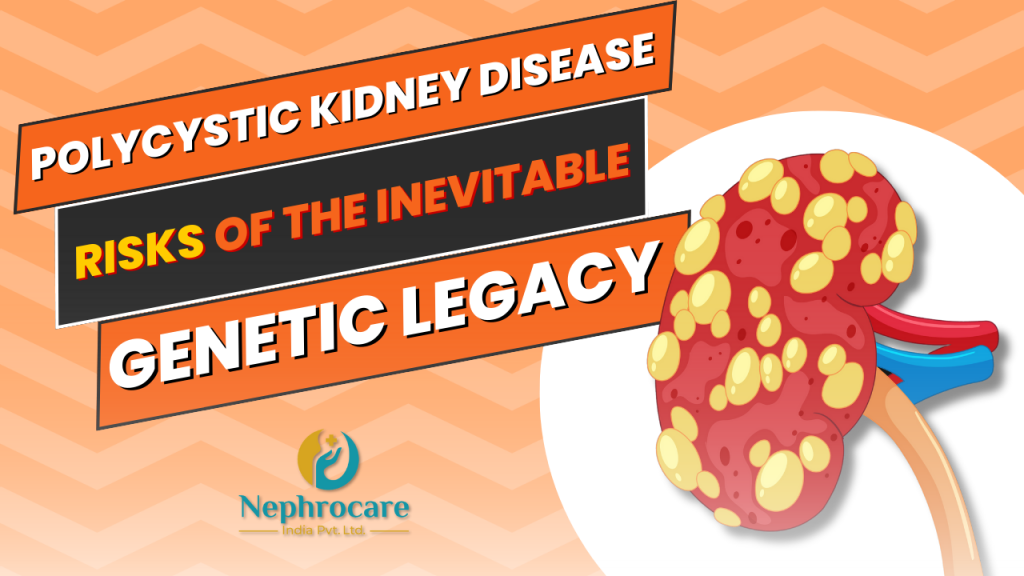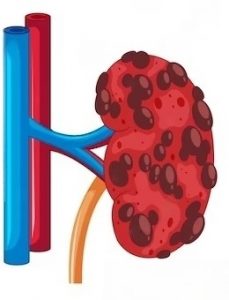
- 1364
- 1
Polycystic Kidney Disease : Risks of the Inevitable Genetic Legacy
In the intricate symphony of our bodies, the kidneys are the unsung heroes, quietly filtering waste, balancing fluids, and regulating blood pressure. But what happens when these vital organs become the battleground for a silent intruder known as Polycystic Kidney Disease (PKD)? Imagine thousands of tiny cysts wreaking havoc within your kidneys, gradually impairing their function. This is the daunting reality faced by millions around the world. Join us as we embark on an enlightening journey through Polycystic Kidney Disease, where information is your compass, leading to better understanding and a path toward improved health.
Polycystic Kidney Disease (PKD), a genetic condition
First of all, we need to know what polycystic kidney disease or PKD is.

Polycystic kidney disease or PKD is a genetic condition where thousands of cysts grow in the kidney. These cysts are fluid-filled sacs that make your kidneys larger and slowly lead to progressive loss of their function and eventually to kidney failure.
PKD is the most common inherited kidney disease and is a common cause of Chronic Kidney Disease.
What are the different types of polycystic kidney disease?
There are two main types of PKD:
- Autosomal dominant polycystic kidney disease or ADPKD:
This is the most common inherited form usually caused by mutations in the PKD1 or PKD2 genes. Though it begins during childhood the symptoms develop usually between the ages of 30 to 40.
- What are the chances of transmitting the disease in the next generations?
The child has a 50/50 chance of inheriting the disease if one of the parents carries the disease gene.
- What are the Autosomal dominant polycystic kidney disease symptoms?
At early ages, there may be no symptoms. The cysts typically begin to expand during adolescence. Symptoms may include:
- high blood pressure which may occur before cysts appear
- pain in the back or sides
- headaches
- enlarged and painful abdomen
- blood in the urine (haematuria)
- recurrent urinary tract infections
- kidney stones
- liver, intestine, brain and pancreatic cysts
- abnormal heart valves
- abdominal wall hernias
- reduced kidney function or kidney failure
- Autosomal recessive polycystic kidney or ARPKD:
This is a less common inherited form of PKD caused by mutations in the PKHD1 gene. It is also called infantile polycystic kidney disease.
- What are the chances of transmitting the disease in the next generations?
A child has a 25% chance of developing ARPKD if both parents carry a faulty version of this gene.
- What are the Autosomal recessive polycystic kidney disease symptoms?
Early signs of the condition can even appear while the baby is still developing in the womb. Some symptoms are:
- the reduced amniotic fluid in the uterus
- an unusual shape to the face due to the lack of amniotic fluid (Potter’s facies)
- enlargement of the child’s abdomen due to enlarged kidneys, liver or spleen
- heart defects
- underdeveloped lungs
- kidney failure at birth or in the first few weeks of life.
However, some with ARPKD do not develop symptoms until childhood or early adulthood.
Can polycystic kidney disease be prevented or cured?
No way has yet been found to prevent PKD or to cure it. But screening of family members (brother, sister and children of PKD patients) and making an early diagnosis and therapy before it sets can lessen or even eliminate some PKD consequences.
Polycystic kidney disease diagnosis:
Diagnosing PKD involves a combination of imaging tests and genetic screening:
- Ultrasound: This non-invasive test can detect cysts in the kidneys and liver.
- CT scan or MRI: These imaging techniques provide detailed views of the cysts and help determine their size and location.
- Genetic Testing: In cases of suspected genetic polycystic kidney disease, DNA testing can confirm the presence of specific mutations. For details please contact our helpline number:
+91 8069841500
- What can I do to slow down PKD?
If you or your child has been diagnosed with PKD, you should follow the tests at the earliest to know the risks for PKD which can help you to take early action. Most importantly, healthy lifestyle practices for instance being active, reducing stress, and quitting smoking can help you delay or prevent kidney failure.
Make lifestyle changes – selfcare is the best care
- Be active for at least 30 minutes every day which can further help you to reduce stress, manage weight, and control your blood pressure. You should go for the MRI (magnetic resonance imaging) test if you play any contact sports like football or hockey to know whether they are safe for you. Moreover, kidney cysts may burst as a consequence of physical trauma, especially to the back and sides of the body.
- Weight loss: Losing weight in addition helps protect your kidneys.
- 7 to 8 hours of sleep is necessary each night: This subsequently improves overall physical and mental health in addition to managing your blood pressure and blood glucose, or blood sugar. To manage your sleep problems you can also go through the blog on Yoga Nidra.
- Stress reduction is likewise important to manage blood pressure and to avoid depression. For instance, getting enough physical activity and sleep helps reduce stress.
- Quitting smoking may help you meet your blood pressure goals, which is good for your kidneys and can lower your chances of having a cardiovascular event. Further, those who have aneurysms mean bulge in the wall of a blood vessel quitting smoking is even more important for them.
- Changing your diet: Dietary changes may include reducing salt, protein, cholesterol (fats) and caffeine to control your pressure and protect your kidney and your test findings will determine the recommended diet for you. A renal dietician can help you make a plan that works for you. You can get ample renal-friendly recipes in “75 Recipes Book“.
To buy a copy click the link below:
Proper intake of prescribed medicines can control your blood pressure and slow the progression of ADPKD to kidney failure. You should not take non-steroidal anti-inflammatory drugs (NSAIDs) without medical advice as they can worsen kidney function.
In conclusion, Polycystic Kidney Disease is a complex genetic condition that can significantly impact a person’s health and quality of life. Early detection, monitoring, and a multidisciplinary approach to care can make a substantial difference in managing PKD and improving long-term outcomes. Above all remember, knowledge is your ally in this journey. Therefore, stay informed and consult with healthcare professionals for the most appropriate care plan for you or your loved ones.
You can read more on the lifestyle changes and selfcare from the following blogs:
Comment
Check Your EGFR
***We Promise, no spam!








2023-10-13 17:03:57
Chandidas Ghosal
Amaro B P high hochha, aga thik chilo, rakhen Tab Cilakar 10/20